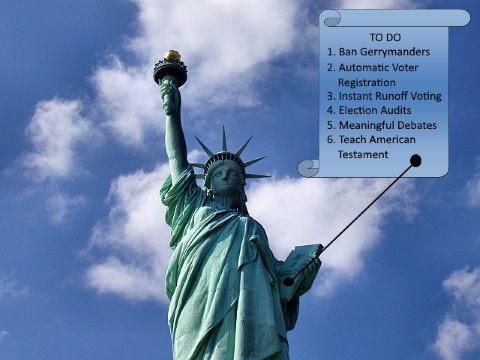Six Simple Ideas to Strengthen Democracy in America
Submitted by hungeski on Tue, 12/06/2016 - 11:26pm
Fair and reliable elections, an informed citizenry, wide participation in governance -- these are cornerstones of democracy. But the recent election in the U.S.A. has pointed out serious cracks in those stones. Gerrymandered districts weakened voters of one party, and made races non-competitive. Recently-erected hurdles stopped many from voting. Big media focused on the horse race, and ignored policy issues. Persons trafficked in misleading and fake news on social media. And, in the end, demagogy and crackpottery carried the day. What follows are six simple ideas that can, I think, be easily implemented, and that might well go a long way toward fixing those cracks and strengthening our democracy.

